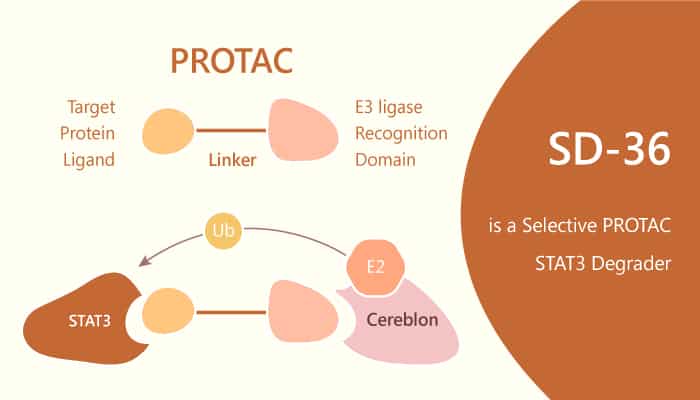Proteolysis targeting chimera (PROTAC) technology has been a type of therapeutics that induces targeted protein degradation. Signal transducer and activator of transcription 3 (STAT3) is an attractive cancer therapeutic target. In this study, Longchuan Bai, et al developed a potent and specific PROTAC degrader of STAT3 and evaluate its therapeutic potential for cancer. Especially, SD-36 is a PROTAC that selectively degrades STAT3.
STAT3, a member of the STAT family, is a latent transcription factor. STAT3 is activated upon phosphorylation of Tyr705, in response to various cytokines, growth factors, and oncogene signals. In particular, SD-36 selectively degrades STAT3 over other STAT proteins. In fact, SD-36 binds to STAT3 with a Kd of 50 nM, and STAT1 and STAT4 with Kds of 1-2 μM. As a result, SD-36 is highly potent in suppressing the transcriptional activity of STAT3.

In vitro, SD-36 effectively reduces the levels of activated pSTAT3 (Y705) with similar potencies in MOLM-16 cells. Moreover, it efficiently degrades STAT3 protein in murine cells. Furthermore, SD-36 inhibits the growth of leukemia and lymphoma cell lines. Collectively, selective degradation of SD-36 results in robust growth inhibition in a subset of leukemia and lymphoma cell lines. In vivo, it induces durable tumor regression in vivo in xenograft models. Besides, SD-36 shows complete and long-lasting tumor regression in mouse tumor models. Finally, it selectively depletes STAT3 protein in mouse xenograft tumors. Taken together, SD-36 effectively induces profound STAT3 depletion in mouse tissues.
All in all, SD-36 is a potent STAT3 degrader with exceptional selectivity over other STAT family members. Degradation of STAT3 protein is a promising cancer therapeutic strategy.